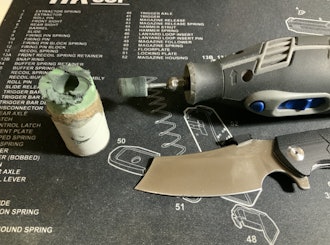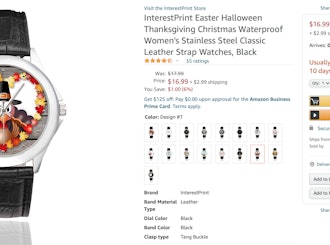Click to view our Accessibility Statement or contact us with accessibility-related questions







Let's Go Camping! - Massdrop East/West Article #27

search
close
Sort by: Newest
keyboard_arrow_down
Let’s get the conversation started!
Be the first to comment.
Related Posts
BillA2021
Buy replacement quartz movement
Is an original quartz movement or a suitable substitution available for my Wenger 7900X watch at a reasonable cost, or is this not feasible I’m new at this. Thanks.
Mar 18, 2021

reswright
Basic Flip Smoothing
So you picked up a budget bearing knife as a ‘project’ knife to putter around with and you’re looking for ideas? One thing you can do is polish the bearing works, smoothing both the flip and the close action until you've got some semblance of a noiseless flick open and a smooth, gravity drop shut. This can be done many, many different ways, as many ways as there are to smooth and then polish metal; your humble narrator prefers to use a Dremel, using the following steps. I should probably make some kind of disclaimer statement here - this guide is for people already handy with a Dremel. If you’re not already handy with one it’s best not to learn how to use one while handling pocket knives or other sharp and pointy things. Hand held high RPM rotary grinding tools can be surprisingly violent if they get out of your firm grasp, they can impart an astonishing amount of kinetic energy to small sharp things you're trying to polish, sending them flying further and faster than...
Feb 6, 2021
RayF
RayF's Guide to Thanksgiving Day Watches
Please do enjoy your Thanksgiving (for those of you in countries where that means something), but please, please, please--whatever you do--don't wear either of these tacky watches while you're doing it!
Nov 26, 2020
Trending Posts in More Community Picks

Graham88
Completely surprised by the lack of blade diversity here on Drop...
I’ve been a collector of Blades since before my teens, and a retailer coming up on 15… or maybe 20 years. Drop has really been kind of an interesting experience for me, because I do occasionally get to see some unusual tech and sometimes EDC items that otherwise I might not have been aware of. And maybe it’s because I have a deep love of cutlery and bladed weapons, but I find myself trolling through the site looking at it what’s available; and it’s just it’s pretty much the same. And the bladed community here is just always confused me.. every single knife is about the same, they’re almost all drop points and although the handle materials change and brands change.. it’s really just the same knife over and over and over again... occasionally you’ll see a tanto or a slight variant; but rarely… and almost never a serrated blade. And I’m just deeply amazed at this diversion of serrated blades. And I’m just surprised there isn’t more of a request for diversity here.... and I...
Mar 12, 2020
JellyDPhoto
Can we get Sony E-Mount or other mirrorless camera options please..
Would be nice to see some Sony E mount full frame cameras on here. I currently shoot with a A99 and they killed the lense path for better or more option lenses and now is all E-Mount. 🤔
Jan 13, 2020
RayF
There Are Pandas, and Then There Are Pandas.
And this isn't either of them! The Pandas we're talking about here, are watches, not bears. And what got me thinking about them (again) was a link posted this morning by @cm.rook who pointed a few of us to the very attractive (and not terribly priced) Yema "Rallygraph" Panda which, in it's most traditional arrangement, looks like the one on the left, but can also be had in the version on the right: The model on the left is a true Panda, while the model on the right is called a reverse Panda. The reason for that distinction is clear--Panda bears, only come in the first arrangement. Now at this point, everyone should be thinking about the most well-know Panda, The Rolex Panda, which is actually a Daytona, and among Rolex Daytonas, the most famous of which is the Paul Newman Daytona, which was famous first, because it was Paul's, and second because it sold at auction for $17.8 million (US Dollars). The story of that auction is well-known so I'll only...
Nov 8, 2019






Draft camp is a weekend devoted to non-stop booster drafts of the new set with the goals of learning the new limited format, experimenting with different cards and archetypes, and collecting empirical data on color combinations and successful booster draft strategies. On the east coast the biggest (and to my knowledge only) draft camp is held in the Washington DC area, and it organized by Massdrop East/West collaborator Alex Majlaton. Alex has done a huge amount of leg work in getting the DC Draft Camp off the ground and into a smoothly run quarterly event for east coast pros, aspiring pros, and community members looking to improve their limited game. The DC Draft Camp has been so successful that in preparation for Pro Tour Amonkhet, it drew upwards of 60 people, and was attended by pros from not only all over the United States, but also several international pros. Recently I was able to sit down with Alex and pick his brain a bit on his experiences in organizing these draft camps and find out about its benefits.
What are the origins of draft camp? Why did you decide to do it? Whenever a new set was released and a Pro Tour was coming up, we always tried to assemble a draft pod with our prerelease packs with as many qualified people as we could find. This plan was serviceable, but it had a lot of problems:
- We often did not have 8 qualified people
- We always had way more than 8 people that wanted to draft
- We had trouble determining who would get the last few slots in a "Pro Tour prep" draft
- Playing a large volume of practice drafts can get kind of expensive
- We always played for the cards, so people were afraid of trying creative strategies that might be bad
- It was tough to schedule these drafts sometimes
I wanted to solve these problems, so I tried to solve them by borrowing as many ideas from other communities as I could.To the best of my knowledge, the pro community in Madison, WI came up with the idea of "draft camp" - collecting as many people in one location and just firing drafts nonstop during release weekend. I also heard of a smaller, more scheduled draft camp in California where a store provided all the product for the drafts.
When our local community organizer Andrew Mitchell found that our local stores were generally willing to let us play with the product that they were planning to open for singles and preorders, that's when I started to put all the pieces together, and that's how DC Draft Camp got started.
What goes into doing it?
DC Draft Camp has two major components: the product and the location. Our draft product is provided by a local game store (MTG First in Glen Burnie, MD). All the cards we open from the new set belong to them and are returned to them after the weekend. They usually open many cases of product to fill preorders and have singles stock, so we have a mutually beneficial arrangement with them where we provide them with the free labor of opening all their product, in exchange for them letting us draft with it. Without this arrangement or a similar one, we couldn't have "phantom" drafts and we'd have the problem of the drafts being too expensive for some people (I've done as many as 8 drafts in one weekend - and that's with me running the show!), or people being too worried about winning the cards to try new things.
The location is also really important. With as many people as we've had, it's not practical for us to play at a store for many reasons - things like us consuming the space of the store without actually being customers, us not having enough privacy, etc. It was an extreme challenge trying to find a location for us to play that could host as many people as we have while also being free or extremely cheap, but I had a lot of help from the Magic community at George Mason University in Fairfax, VA. At GMU (and most college campuses I imagine), if you operate a club on campus, you can reserve meeting rooms on campus for club usage at no cost, so I collaborated with the leadership of the GMU Magic Club (Zach Ashton and Naod Haddish) to have the event sponsored by them in exchange for opening it up to all GMU students (which is not a problem since the event is free to participate in). The meeting rooms on campus have plenty of space, tables, and chairs for us to play on, and being on a college campus is very convenient since it's often surrounded by places to eat and there's lots of parking.
Beyond those two things, the rest of it is just logistics, coordination, and writing instructions. Even though the event is pretty laid back, there are still lots of rules and procedures - I have to cover things like making sure everyone knows the cards aren't theirs to keep, making sure everyone plays with sleeves, letting everyone know where the event is and where they can park and eat, making sure that the environment is mature and respectful and not toxic, etc. I typically learn about some new base that is helpful for me to cover after every camp I put together.
What are some of the benefits you've seen?
For the pros and players otherwise qualified for the upcoming PT, they get the major benefit of a lot of rapid exposure to all the new cards, and not just reading the spoiler - seeing them in action, seeing how they work with each other, seeing how high (or low) they tend to get picked in draft... lots of information that's really valuable to have when preparing for the draft portion of the PT.
For the players who aren't qualified, they get to play in the best kind of drafts - low-stakes drafts with serious, competitive players. On top of that, they're in an environment where people are constantly evaluating new cards, sharing those evaluations with each other, and asking each other for deckbuilding advice. It's like getting a full day of Magic coaching for free.
For myself, a major benefit that I didn't expect is that I gained a lot of experience with setting up and running an event. I never really thought of myself as the leadership type, but making sure an event like this is run smoothly requires a lot of confident decisionmaking, which is a skill that is extremely valuable in a lot of other fields.
Perhaps the biggest benefit of all is that it's just plain fun. Having 30-40 people that are all people who are serious about improving at Magic in the same room drafting nonstop creates a very unique environment. It reminds me of a mix between old regional prereleases (where everyone is there on their own schedules, playing in their own events, but it's still kind of laid back and enjoyable and people have a chance to catch up with each other throughout the day) and old PTQs (where everyone is there to win and try to get to the next level, and they're constantly trying to analyze their game).
Tell me about the data analytics.
One common practice (at least in our drafts) was for people to take pictures of their decks that went 3-0, so we could get ideas about what successful decks looked like. This is a useful and interesting practice, but it doesn't tell the whole story - you only get a snapshot of what works, not necessarily what doesn't. After a couple camps, I realized that if I could collect data from everyone about what colors they drafted and what their records were, I could try and put together a more complete data set and potentially gain more insight into the format.
It started with just asking someone in each pod to ask for color and record information from each player. I would then manually compile all the data into a spreadsheet and analyze color pair win rates. From that point, I just looked for ways to improve something about the process each time - how to collect more accurate data, how to make sure everyone participates, etc.
The process now is to have everyone fill out an online survey form after every draft they do, which has questions like "what colors did you play?" "what was your record?" "how many lands did you play?" The online survey form captures the responses and feeds them to a spreadsheet, which I then have analyzed after the weekend.
The data itself helps to answer a lot of interesting questions that normally would have to be answered just by feel - questions like "which archetype wins the most?" and "how many lands should I play: 16, 17, or 18?" I'm always trying to think of new and interesting questions to ask players about their drafts, while keeping in mind that the survey forms have to be easy to fill out and not a chore.
Your data analytics remind me of a Moneyball-like statistical view on the game. Have you found that the data coming out of the camps is correct in predicting the best courses for success in limited drafting?
Looking at the data is really interesting, but I wouldn't say that it gives the solution to the format. Rather, it reveals how people are approaching the format at first glance. In general I've found that lately a lot of limited formats have fewer cards that are unplayable, and more cards that are "tricky" - that is, it's not immediately obvious how to use them. That's one of the most interesting things you can learn from draft camp data, just from looking at the archetype win rates. If your data indicates that your blue/black decks aren't winning very often, then it could mean that the color pair just isn't very good, or it could mean that you can't just pick the obvious blue and black cards and settle in - you might need to adjust your pick orders and take the "tricky" cards that aren't as obvious to make the archetype work. In general, the data doesn't (and shouldn't) give the answers to the format, but it should guide your further study of the format.
While the draft camp for Amonkhet was very well attended, the most recent camp for Hour of Devastation had around half of that attendance. Many correlate this with the earlier release of sets on Magic Online. Do you foresee the new release dates putting an end to draft camps?
I definitely see less value now in hosting camp than I did before because of the new Magic Online schedule, but there are still a lot of good reasons to do it. That said, I do kind of think that the "heyday" of the DC camp is more or less over, since a lot of pros that have traveled a great distance to practice draft for the PT are likely to just choose to play online now instead, and future camps will be limited just to the people in the area, and perhaps people who are willing to travel and prefer to play with paper cards rather than online.
The MTGO schedule won't put an end to draft camp, but the updated PT schedule might. For example, I already know that I won't be running an event for Ixalan because the schedule doesn't work out. Prior to Ixalan, the schedule was always prerelease weekend, followed by release weekend/draft camp, followed by a limited Grand Prix and then the pro tour, so everyone would come to camp to practice for the upcoming GP & PT.
For Ixalan, the schedule is the prerelease, followed immediately by a Grand Prix, and then the pro tour isn't until a few weeks after the World Championships. I can't host it on what would be release weekend because of the Grand Prix (which I'd prefer to go to myself), and I can't host it using the store's product on any weekend after that because they need it opened for singles as soon as possible. I'll have to see what the schedule for Rivals of Ixalan is like before deciding whether I can run it again or not.
What do you see as the future of draft camp? As for the future of draft camp, if the schedules change in such a way that the logistics of using the store's product don't work out any more, we'll have to return to providing our own packs and playing for the cards, which will likely cause the attendance to shrink down to just one or two drafts again. The event itself is so great though, that if it makes sense for me to host it, I'll probably host it, just because it makes a lot of people happy.